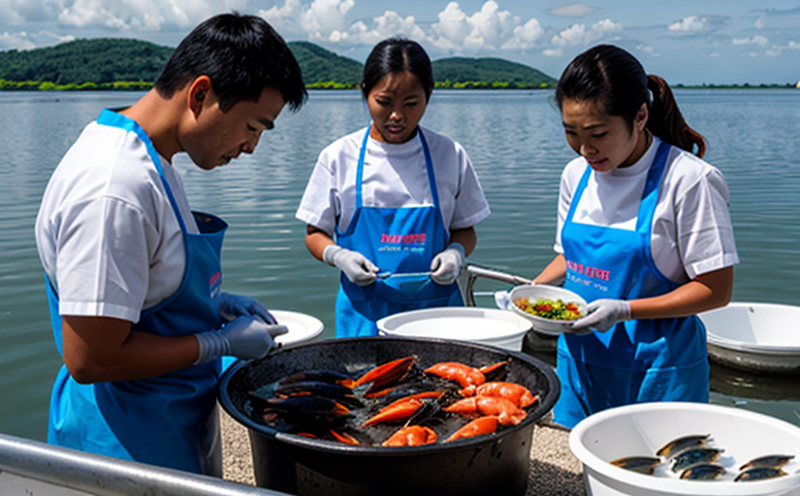ISO 11047 Hormone Residue Analysis in Farmed Fish
The ISO 11047 standard is pivotal in ensuring the safety and quality of seafood products, particularly those derived from farmed fish. This international standard provides a robust framework for detecting hormone residues in aquatic organisms to uphold consumer health standards and comply with regulatory requirements worldwide.
Our laboratory has extensive experience in conducting ISO 11047 compliance testing using advanced analytical techniques such as liquid chromatography-tandem mass spectrometry (LC-MS/MS). This method ensures high sensitivity, selectivity, and precision necessary for detecting even trace levels of hormones. The process involves rigorous sample preparation including homogenization, extraction, and clean-up steps to eliminate matrix interferences.
Regulatory bodies like the European Union, United States Food and Drug Administration (FDA), and World Health Organization (WHO) have adopted ISO 11047 as a key standard for ensuring that hormone residues in farmed fish do not exceed safe limits. Compliance with this standard helps stakeholders maintain consumer confidence while also avoiding potential legal and economic penalties.
Our laboratory adheres to strict quality management systems, including ISO/IEC 17025 accreditation, to ensure accurate and reliable results. We provide detailed reports that include method validation data, calibration curves, extraction efficiencies, and quantification limits. Our team of experts can also offer guidance on sample preparation and interpretation of results.
By choosing our service for ISO 11047 compliance testing, you are investing in the integrity of your supply chain and the safety of your products. We understand that maintaining regulatory compliance is critical to your business success and we are committed to delivering accurate, timely, and actionable data.
Customer Impact and Satisfaction
Our clients benefit significantly from our ISO 11047 hormone residue analysis service. Quality managers and compliance officers can rest assured that their products meet the stringent standards set by international regulatory bodies, thereby enhancing brand reputation and market credibility.
- Informed Decision-Making: By leveraging our expertise in ISO 11047 testing, stakeholders gain valuable insights into potential risks associated with hormone residues. This knowledge enables them to make informed decisions that align with best practices and regulatory expectations.
- Avoiding Legal Risks: Compliance with international standards like ISO 11047 helps organizations avoid costly legal actions, fines, or product recalls due to non-compliance.
- Enhanced Consumer Trust: Demonstrating adherence to global safety standards fosters trust and loyalty among consumers, which is crucial in the seafood industry where transparency and integrity are paramount.
We strive for customer satisfaction by providing comprehensive support throughout the testing process. Our team offers expert advice on sample preparation, interpretation of results, and compliance strategies tailored to meet individual business needs.
Environmental and Sustainability Contributions
- Eco-friendly Practices: By ensuring that hormone residues in farmed fish do not exceed safe limits, our service helps mitigate the risk of environmental contamination. This contributes to a healthier aquatic ecosystem.
- Sustainable Aquaculture: Compliance with ISO 11047 supports sustainable aquaculture practices by promoting responsible use of feed and management of biological waste products.
- Reduction in Harmful Chemicals: The accurate detection and control of hormone residues through our testing service can lead to reduced usage of harmful chemicals, thereby enhancing the overall sustainability profile of farmed fish operations.
Our commitment to environmental stewardship aligns with broader sustainability goals within the food and feed sector. By offering this high-quality analytical service, we contribute positively to the health and welfare of both human populations and aquatic ecosystems.
Use Cases and Application Examples
The ISO 11047 standard is widely applicable across various segments within the food and feed testing sector. Here are some specific use cases:
- R&D in Aquaculture: Researchers can utilize this service to evaluate new feeding strategies or breeding programs for their effects on hormone levels.
- Supply Chain Management: Procurement teams can leverage ISO 11047 compliance data to source quality products from reputable suppliers.
- Regulatory Compliance Audits: Regulatory bodies and internal auditors use these results to ensure that all farmed fish operations adhere to strict safety standards.
In addition, our service is crucial for addressing potential issues such as accidental contamination or intentional adulteration. By identifying hormone residues early in the supply chain, stakeholders can implement corrective measures promptly, minimizing risks and ensuring product integrity.
We provide a range of additional services to support your broader quality assurance efforts including nutritional profiling, allergen testing, and mycotoxin analysis, all tailored to meet specific industry demands.





